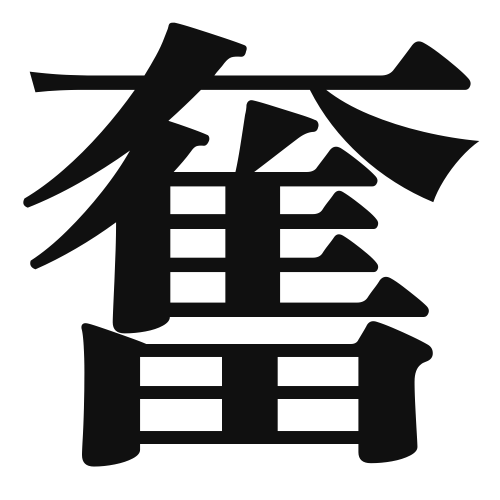1. Overview of Meaning
The kanji “奮” (pronounced “fun”) generally means to strive, to exert oneself, or to be enthusiastic. It conveys a sense of effort and determination in pursuing goals or overcoming challenges.
2. Formation and Radical
Formation of the Kanji: The kanji “奮” is a compound character (会意文字) that combines elements to convey its meaning. It consists of the radical “女” (woman) and “分” (to divide or to share), suggesting a sense of effort or action associated with a person.
Radical: The radical of “奮” is “女,” which often relates to femininity or roles traditionally associated with women.
3. Examples of Usage
Common Words and Phrases: Some frequently used words that include “奮” are:
- 奮闘 (ふんとう, “funtou”) – to struggle or to fight hard
- 奮起 (ふんき, “funki”) – to rise up or to be motivated
Example Sentences in Daily Conversation:
- 彼は試験に合格するために奮闘しています。
(He is striving hard to pass the exam.) - 新しいプロジェクトに奮起して取り組んでいます。
(I am motivated to tackle the new project.)
4. Synonyms and Antonyms
Similar Kanji: A similar kanji is “努力” (どりょく, “doryoku”), which means effort or endeavor. While both convey a sense of striving, “奮” emphasizes enthusiasm and vigor, whereas “努力” focuses more on the act of making an effort.
Antonyms: An antonym of “奮” could be “怠惰” (たいだ, “taida”), which means laziness or idleness, representing a lack of effort or motivation.
5. Cultural and Historical Background
Relation to Japanese Culture: The concept of “奮” is deeply embedded in Japanese culture, where hard work and perseverance are highly valued traits. It reflects the spirit of “ganbaru” (頑張る), which means to do one’s best or to persevere.
Proverbs and Idioms: One relevant proverb is “奮闘努力” (ふんとうどりょく, “funtou doryoku”), which means to strive and make efforts, emphasizing the importance of both enthusiasm and hard work in achieving success.
